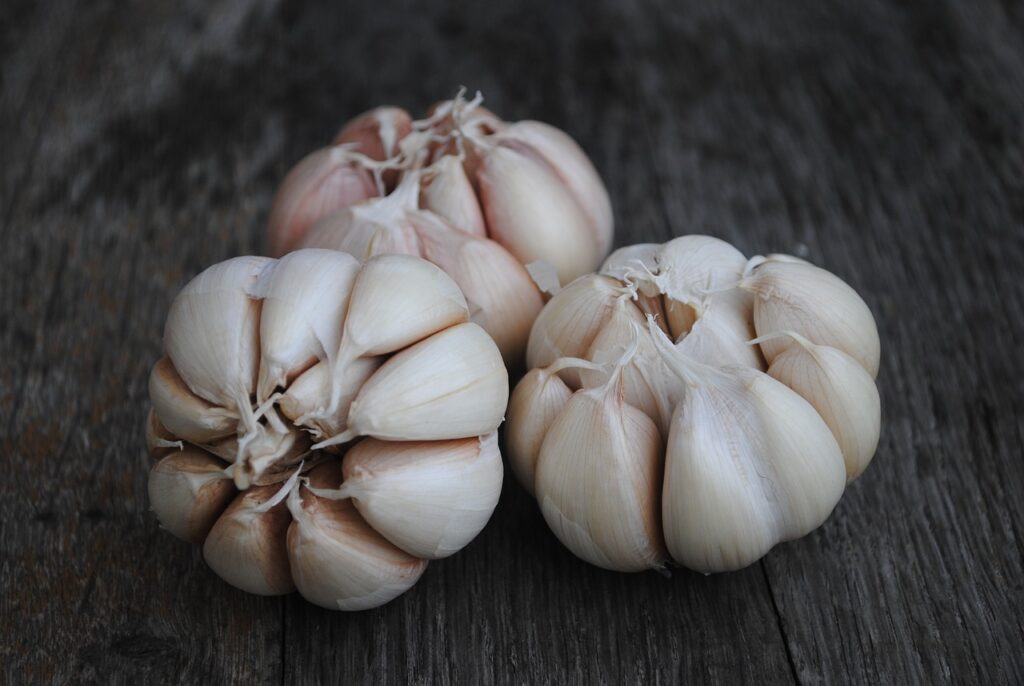Garlic (Allium sativum), a kitchen staple revered for millennia, has emerged as a powerhouse in natural cardiovascular health support. This comprehensive guide explores the scientifically-proven benefits of garlic, backed by current research and expert insights.

Table of Contents
Understanding Garlic’s Therapeutic Properties
Active Compounds
Garlic’s medicinal properties primarily stem from allicin, its key bioactive compound. When fresh garlic is crushed or chopped, an enzyme called alliinase converts alliin to allicin, releasing the characteristic sulfur compounds responsible for both its pungent aroma and health benefits.
Cardiovascular Benefits
1. Blood Pressure Management
- Clinical studies show significant reductions in both systolic and diastolic blood pressure
- Meta-analyses indicate an average reduction of 8-10 mm Hg in systolic pressure
- Most effective in individuals with existing hypertension
- Regular consumption may reduce cardiovascular risk by 16-40%
2. Cholesterol Regulation
- Demonstrated ability to lower total cholesterol by 10-15%
- Reduces LDL (bad) cholesterol by 10-20%
- Effects typically visible after 8-12 weeks of regular consumption
- Most effective when combined with a heart-healthy diet
3. Atherosclerosis Prevention
- Slows arterial plaque formation
- Improves blood vessel flexibility
- Reduces calcium buildup in arteries
- Enhances overall vascular health
4. Blood Clot Prevention
- Natural blood-thinning properties
- Reduces platelet aggregation
- Improves blood flow
- Supports overall circulation
Optimal Usage Guidelines
Recommended Forms
- Fresh Garlic
- Most potent form
- 2-4 cloves daily (4-8g)
- Best consumed crushed or chopped
- Aged Garlic Extract
- Standardized supplements
- 600-1,200mg daily
- Reduced odor, better tolerance
- Garlic Powder
- Convenient alternative
- 900mg daily divided doses
- Look for standardized products
Safety Considerations
Potential Side Effects
- Breath and body odor
- Digestive discomfort
- Increased bleeding risk
- Possible heartburn
Drug Interactions
- Anticoagulants (warfarin, aspirin)
- Blood pressure medications
- HIV/AIDS medications
- Birth control pills
Special Precautions
- Pre-surgery
- Discontinue 2 weeks before surgery
- Inform healthcare providers about usage
- Pregnancy and Nursing
- Moderate dietary amounts are safe
- Avoid supplemental forms
Scientific Evidence
Recent Research Highlights
- American Heart Association (2023)
- Comprehensive review of garlic’s cardiovascular benefits
- Strong evidence for blood pressure reduction
- Promising data on atherosclerosis prevention
- Journal of Nutrition (2022)
- Meta-analysis of 42 trials
- Significant cardiovascular risk reduction
- Positive impact on arterial health
- European Journal of Clinical Nutrition (2023)
- Long-term safety assessment
- Favorable risk-benefit profile
- Recommendations for optimal dosing
Expert Recommendations
Healthcare Provider Insights
- Regular monitoring for those on medications
- Individual dosing adjustments as needed
- Integration with conventional treatments
Quality Selection Guidelines
- Choose reputable manufacturers
- Look for standardized products
- Verify third-party testing
Research Sources
- National Center for Complementary and Integrative Health (NCCIH)
- Cleveland Clinic
- American Heart Association
- World Health Organization (WHO)
- Journal of Nutrition
This comprehensive guide provides evidence-based information while remaining accessible to general readers. Remember to consult healthcare providers before starting any new supplement regimen, especially if you have existing health conditions or take medications.

